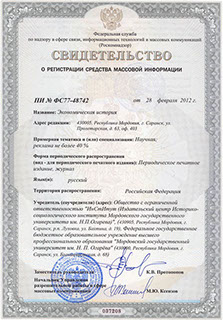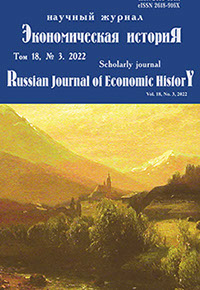Экономическая историЯ
Russian Journal of Economic History
ISSN 2409-630X (Print)
ISSN 2618-916X (Online)
Expert board:
- Scientific Council of RAS on economic history;
- Research and Educational Center «The economic history of Central Russia and the Middle Volga region» of Ogarev Mordovia State University;
- Center of Economic History of Lomonosov Moscow State University
Navigation
Certificate of registration

ISSN 2409-630X (Print), ISSN 2618-916X (Online)
DOI: 10.15507/2409-630X.058.018.202203.211-220
Ivan M. Baydakov
The Russian Presidential Academy of National Economy and Public Administration (Moscow, Russia), e-mail: Baydakov-im@ranepa.ru, Baydakovim@gmail.com
Objectives of the Medium-Term Programs of Social-Economic Development of the Russian Federation from 2000 to 2008
Abstract
Introduction. Social-economic development of the Russian Federation in the XXI century are determined by three types of strategic documents – for the long-term, medium-term, and short-term prospects. From 2000 to 2008 the Government of the Russian Federation has approved three development programs. The purpose of this research is а study of the priorities of reforms implemented by President Putin from 2000 to 2008, based on the materials of three medium-term socio-economic development programs. The researcher used various modern methods of historical and political science research, including: content and comparative analysis, the method of comparative institutional analysis.
Results. At the first stage, from 2000 to 2003, the government declared the solution of social problems - levelling the poverty level, raising incomes, solving problems with social benefits, and only at the second and third stages it was planned to implement administrative and economic reforms. In the second program, the priority was shifted towards economic and institutional transformations. In the third document, on the one hand, the focus of the Government’s attention returned to the social agenda and on the other, the country’s leadership did not declare new reforms, only continuing the ones being implemented.
Discussion and Conclusion. The relevant decisions on prioritization and implementation of reforms could be motivated by several factors: firstly, successful economic stabilization, and secondly, strengthening the power and economic foundations of the state. Thirdly, the decrease in motivation to reform the economy could be caused by the new rental income (oil and gas).
Keywords: modernization of modern Russia, Putin’s economy, Putin’s modernization, socio-economic development of Russia in the XXI century, reforms of the Russian Federation.
For citation: Baydakov I. M. Objectives of the medium-term programs of social-economic development of the Russian Federation from 2000 to 2008. Ekonomicheskaya istoriya = Russian Journal of Economic History. 2022; 18(3): 211–220. (In Russ.). DOI: 10.15507/2409-630X.058.018.202203.211-220.
© Ogarev Mordovia State University. History and Sociology Institute, 2017
68, Of. 411, Bolshevistskaya St., 430005, The editorial office of the scholarly journal «Russian Journal of Economic History»
Tel.: (8342) 24-25-90; 27-07-11, Fax: (8342) 24-25-90, E-mail: jurnal-econom-hist@isi.mrsu.ru
Designed by A. Napalkov, Email: napalkov@isi.mrsu.ru

